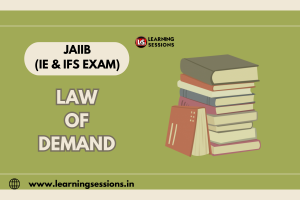In the field of economics, the Law of Demand is an elementary principle that explains the inverse relationship between price and quantity demanded. In simple terms, when the price of a product or service increases, the demand for it decreases, and when the price decreases, the demand increases, provided all other factors remain constant. Comprehending this law is necessary for banking professionals preparing for the JAIIB (Junior Associate of the Indian Institute of Bankers) examination,especially in the context of the Indian Economy (IE) and the Indian Financial System (IFS). Learning Sessions presents this article that will explore the application of the Law of Demand within the Indian economy through a case study format.

📚 JAIIB Study Resources 📚
👉 Check Here
👉 Check Here
👉 Check Here
👉 Get Tests Here
👉 Check Here
DOWNLOAD PDF LAW OF DEMAND – CASE STUDY
The Law of Demand considers that, ceteris paribus (all other factors being equal), the quantity demanded of a good or service will decrease if its price increases and vice versa. This relationship is depicted through the demand curve, which slopes downward from left to right.
The Key Elements of the Law of Demand are :
-Price: The main driver influencing demand.
-Quantity Demanded: The amount of a good or service that consumers are willing and able to purchase.
-Inverse Relationship: Higher prices lead to lower demand, and lower prices lead to higher demand.
For the extensive preparation of candidates, get details through our YouTube videos for JAIIB IE & IFS Module wise Syllabus with explanations and tips to help candidates in their preparation journey.
You may also like these JAIIB Case Studies:
JAIIB | IE & IFS | BANKING STRUCTURE IN INDIA
JAIIB | IE & IFS | DEPOSITS AND ADVANCES
To summarize, the Law of Demand is an essential notion for interpreting consumer behavior in the Indian economy and its implications on the financial system. Through this case study by Learning Sessions, we observe how changes in price can directly influence the quantity demanded, impacting various sectors, including transportation, banking, and energy. For all the applicants preparing for the JAIIB examination, a thorough grasp of economic concepts like the Law of Demand is significant. The knowledge of such principles helps banking professionals make informed decisions regarding credit, investments, and risk management in dynamic economic conditions.
Learning Sessions provides additional information about JAIIB IE & IFS TYPES OF FDI by giving examples of real life scenarios.
Learn more about this case study through our YouTube channel and PDF.
Get access to our Telegram Channel for free Pdfs of JAIIB.





